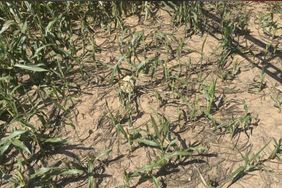:max_bytes(150000):strip_icc()/CaseCombineAndTractorHarvesting1-WideShot-2000-60b55def8bf8468c99137e74255f4197.jpg)
The agriculture committees of both the U.S. House of Representatives and the Senate support crop insurance in the farm bill working its way through Congress. Yet, farm groups and some members of Congress are worried that the Harvest Price Option (HPO) in crop insurance revenue policies could be eliminated or weakened when the bill is debated on the floor of the House and in the Senate.
The harvest price option really isn't an option any more. It's now included in revenue crop insurance unless a farmer chooses an exclusion to eliminate it.
"Very few farmers choose the exclusion," says Sam Willett, a lobbyist with the National Corn Growers Association in Washington, D.C. For corn, 98% of revenue insurance keeps the harvest price coverage. As most farmers know, the HPO increases the insured value of a crop if new-crop futures rise in the fall. The drought of 2012 triggered higher harvest prices, which prevented even greater losses to insured Corn Belt farmers that year.
"If a farmer loses a crop, they're still obligated to deliver under a contract," Willett says. If they have to pay higher prices to replace bushels they didn't grow, it creates a financial hardship. The Illinois Corn Growers have surveyed members to see how common sales under forward contracts are and other states may also participate in the survey, Willett says.
Opposition to HPO
The HPO is an attractive target for budget hawks in Congress. Last year the Congressional Budget Office estimated that dropping HPO from revenue insurance would cut the government's cost for crop insurance by about 25%, or more than $19 billion over 10 years.
Willett says that groups that have long opposed current spending on crop insurance, including the Environmental Working Group, the Heritage Foundation, and the American Enterprise Institute, seem to be working more closely to find opponents in Congress who might offer amendments to trim crop insurance spending. He believes the HPO is at greater risk than it was when the last farm bill was passed.
The chairman of the House Agriculture Committee, Representative Mike Conaway, is expected to meet with fellow Republicans this Friday and is likely to urge them not to offer amendments like those that would weaken crop insurance. Willett is hoping that because the committee's farm bill doesn't increase federal spending that members who are conservative on spending won't target crop insurance.
Other farm groups share his concern.
"I think the risks are larger than they might otherwise be," says Roger Johnson, president of National Farmers Union in Washington. "We're in a really crazy political environment here, and it's hard to predict."
Republicans vs. Democrats
Johnson points to last week's passage of a farm bill out of the House Agriculture Committee along a party line vote, breaking a long bipartisan tradition in the committee.
Among Democrats, there was anger that the committee approved additional requirements on states to monitor and train food assistance recipients, diverting funds from the Supplemental Nutrition Assistance Program (SNAP) to pay for the new program.
"Most Democrats philosophically feel the crop insurance subsidies are too generous, especially when juxtaposed to the treatment of SNAP," Johnson says.
On the other side of the aisle, "there's a very significant group of Republicans that also just don't like any kind of crop insurance subsidy," he adds.
These political differences are so strong that Senator Charles Grassley (R-IA), a member of the Senate Agriculture Committee, told reporters earlier this week that Conaway may have to rewrite his committee's bill to get it passed in the House. The House is expected to debate the measure in about two weeks.
Grassley also worries about keeping current levels of federal spending support for crop insurance.
"Maintaining it where it is is going to be a fight, and I hope we can do that," he told Agriculture.com.
When asked if the HPO is more threatened now that when the last farm bill was written, he replied, "Yeah."
The reason? "Probably the budget situation," he said.
This week, the Congressional Budget Office projected that the annual federal deficit will surpass $1 trillion by 2020.









